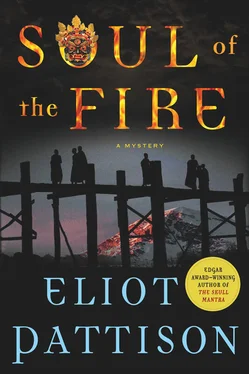Eliot Pattison - Soul of the Fire
Здесь есть возможность читать онлайн «Eliot Pattison - Soul of the Fire» весь текст электронной книги совершенно бесплатно (целиком полную версию без сокращений). В некоторых случаях можно слушать аудио, скачать через торрент в формате fb2 и присутствует краткое содержание. Год выпуска: 0101, ISBN: 0101, Издательство: St. Martin, Жанр: Полицейский детектив, на английском языке. Описание произведения, (предисловие) а так же отзывы посетителей доступны на портале библиотеки ЛибКат.
- Название:Soul of the Fire
- Автор:
- Издательство:St. Martin
- Жанр:
- Год:0101
- ISBN:9781250036476
- Рейтинг книги:4 / 5. Голосов: 1
-
Избранное:Добавить в избранное
- Отзывы:
-
Ваша оценка:
- 80
- 1
- 2
- 3
- 4
- 5
Soul of the Fire: краткое содержание, описание и аннотация
Предлагаем к чтению аннотацию, описание, краткое содержание или предисловие (зависит от того, что написал сам автор книги «Soul of the Fire»). Если вы не нашли необходимую информацию о книге — напишите в комментариях, мы постараемся отыскать её.
Soul of the Fire — читать онлайн бесплатно полную книгу (весь текст) целиком
Ниже представлен текст книги, разбитый по страницам. Система сохранения места последней прочитанной страницы, позволяет с удобством читать онлайн бесплатно книгу «Soul of the Fire», без необходимости каждый раз заново искать на чём Вы остановились. Поставьте закладку, и сможете в любой момент перейти на страницу, на которой закончили чтение.
Интервал:
Закладка:
“Your predecessor? He was a very sick man.”
“You must have an idea what caused his death.”
She took another cigarette. “His heart stopped beating.”
Shan sipped his tea. It was better this way. He didn’t believe information he didn’t fight for. “Tibetan prisoners have a saying: Life is their sickness and death is the cure. If they believed in burial in the earth, the words would be chiseled on thousands of tombstones. What was his cure?”
“There was nothing that could be done for him. He had a very weak heart.”
“But you had to list a cause on the official report.”
Lam drew deep on her cigarette, then let the smoke curl back out of her mouth. “You’ve been in the meetings. He was bored to death.”
“I’ve seen the photographs, Doctor. He drank some tea-then he stopped breathing. I think if I am sitting in his chair, I should be allowed to see the report. What was in his stomach?”
“It would have been an intriguing report. Xie was very weak. I found him one day gasping in the stairwell from climbing three flights. I knew he had had several government jobs, so I asked for his detailed medical file to be sent from Lhasa. He had severe muscle damage in his heart, two heart attacks in the past five years. He was prescribed digitalis to control the rhythm. I could have listed heart disease as the cause and not been challenged. But there is no report. The only file I had was taken by Major Sung.”
Shan put down his cup. “You mean Public Security took the body because it is still investigating.”
“I had to endure an hour of shouting from Major Sung and then two dozen of his brutes combing every inch of my facility. I would tend to think it was not Public Security.”
Shan straightened. “Not Public Security that did what exactly?”
“I foolishly called a meeting of my staff. One of my damned orderlies declared to everyone that our building is constructed over a mass grave for Tibetan monks.”
He stared at the doctor. This was not the conversation he’d been expecting. “You’re saying dead monks were here?”
“My Tibetan assistant announced that you can still smell their incense down around the foundations, reminding us that the dead do not forget. I told them don’t be silly, we all know Tibetans believe in reincarnation, that their spirits move on to the next life. But she corrected me in front of all my staff. She said that was not true for those who die violently, without preparation, and that hundreds died that way here. They roam as ghosts, confused and often angry. More and more of my staff are insisting on leaving before dark. Some are showing up with charms they buy from that Tibetan market along the town wall.”
She saw the impatience in Shan’s eyes. “Xie’s body was wheeled in here at the end of the shift. We confirmed he was dead and called for the body to be picked up in the morning for a detailed exam in Lhasa. But when I arrived just after dawn, there was nothing but an elaborate chalk drawing on the wall. Tibetan ghosts had taken the body away.”
* * *
Shan watched from a darkened office near the utility stairwell as the janitors swept the hall, then swiftly followed as they descended the stairs, blocking the shutting door with his foot. He waited until they had disappeared onto the floor below to enter the stairwell.
The stairs narrowed after passing the ground floor. The bottom landing opened into a dim, musty corridor of unpainted cinder block. From somewhere came the muted whine of elevator motors. A pipe dripped into a bucket. He moved warily along a row of mops and pails reeking of ammonia toward the only lit doorway and paused at the half-open door. He waited, then, hearing nothing, slipped inside.
Benches lined two walls, below tattered coats hanging on pegs. Under the benches were wire baskets holding shoes that were as worn as the coats. Here was where the custodians started and ended their shifts. On pegs by the entry hung a clipboard with work assignments and several rings of keys. He studied the clipboard, trying to make sense of what was written. All the names were Tibetan, and the assignments seemed to cover multiple buildings.
Slipping one of the key rings into his pocket, he ventured farther down the hall, testing doors, finding mostly storage rooms holding office furniture and cleaning supplies, though one held medical equipment. He stood in the hall with his eyes closed, trying to decide what it was he sought. Lam’s assistant said she could still smell the incense of the dead monks.
At the end of the corridor, he opened the heavy metal door onto an outside landing, where stairs led up to ground level. Holding the door open, he tested the keys to confirm that one of them operated the lock, then ascended the stairs.
Standing by the bike rack at the top of the stairs, Shan visualized the landscape as he had first seen it years earlier. Barley fields and pastures had extended to the horizon, ending in the first of the low, fresh-packed mounds, which was indeed where this building, closest to the old abbey, now stood. The sublevel had been dug deep into the earth. Bulldozers probably just swept the old bones aside.
A great sadness suddenly welled up inside Shan, and he found himself gripping the metal rail around the stairwell for support. It was a new thing, these terrible attacks of despair that seized him like a physical illness, leaving him weak and unsteady. The first time, Lokesh found him on the ground, weeping before an ancient stone Buddha, a favorite shrine in the mountains, whose body had been riddled with bullets by a passing army patrol. Now a dark foreboding gripped him. He needed Lokesh. Lokesh was his anchor, Lokesh was his hope, Lokesh was the one who’d made him understand he was more than a pathetic ex-convict whose life consisted of pitching mud and begging to see his imprisoned son.
He shook his head violently, trying to dispel the self-pity. Zhongje and the Commission were like poisons in his blood, and he had to fight to keep them out of his heart. At last, gazing at the stars, he calmed, took several deep breaths, and stepped back inside.
Lam’s assistant would have gone to the sublevel on infirmary business. He moved back to the room with the medical supplies, discovering that it was not so deep as the others. Along the rear wall were upended hospital beds stored on dollies, and the wheels of the center one had repeatedly scored the floor. He tugged at the unit, swinging it outward to reveal a narrow, locked door with a sign marked MEDICAL SUPPLIES UNAUTHORIZED ENTRY PROHIBITED. He lifted the ring of keys and began trying them.
When he finally opened the door, the faint smell of incense wafted out. He gazed in mute surprise for a moment, then stepped in and shut the door behind him. The cement floor had been covered with cedar planks, in the fashion of an old country chapel. Along the rear wall was an altar made of packing crates topped with a length of white silk on which a twelve-inch-high bronze Buddha sat, flanked by a flickering butter lamp and an incense holder. Over the altar, on a shelf near the ceiling, half a dozen human skulls looked down. The dead monks of Sungpa Abbey were watching him.
Shan did not know how long he sat before the little Buddha, but when he finally climbed the outside stairs, it was long past midnight. All the way across the courtyard, he clutched the ring of keys, praying the custodians would not suffer if they were found to be missing. He unlocked the sublevel door of the building where his sleeping quarters were and climbed the inner stairway, hesitating for only a moment at his floor before continuing up to the top landing.
For a moment as he stepped into the chill autumn air, he forgot himself, forgot everything. Miles of rolling hills and mountains were washed in silver moonlight, the distant peaks glistening with fresh snowfall. On the highway to the south, the lights of a solitary truck glided over the landscape. Overhead, thousands of stars glittered. It was the kind of night Lokesh savored-a beckoning night, he would call it. The old Tibetan would invite Shan to join him by a small brazier where they would keep their tea warm while counting meteors.
Читать дальшеИнтервал:
Закладка:
Похожие книги на «Soul of the Fire»
Представляем Вашему вниманию похожие книги на «Soul of the Fire» списком для выбора. Мы отобрали схожую по названию и смыслу литературу в надежде предоставить читателям больше вариантов отыскать новые, интересные, ещё непрочитанные произведения.
Обсуждение, отзывы о книге «Soul of the Fire» и просто собственные мнения читателей. Оставьте ваши комментарии, напишите, что Вы думаете о произведении, его смысле или главных героях. Укажите что конкретно понравилось, а что нет, и почему Вы так считаете.












